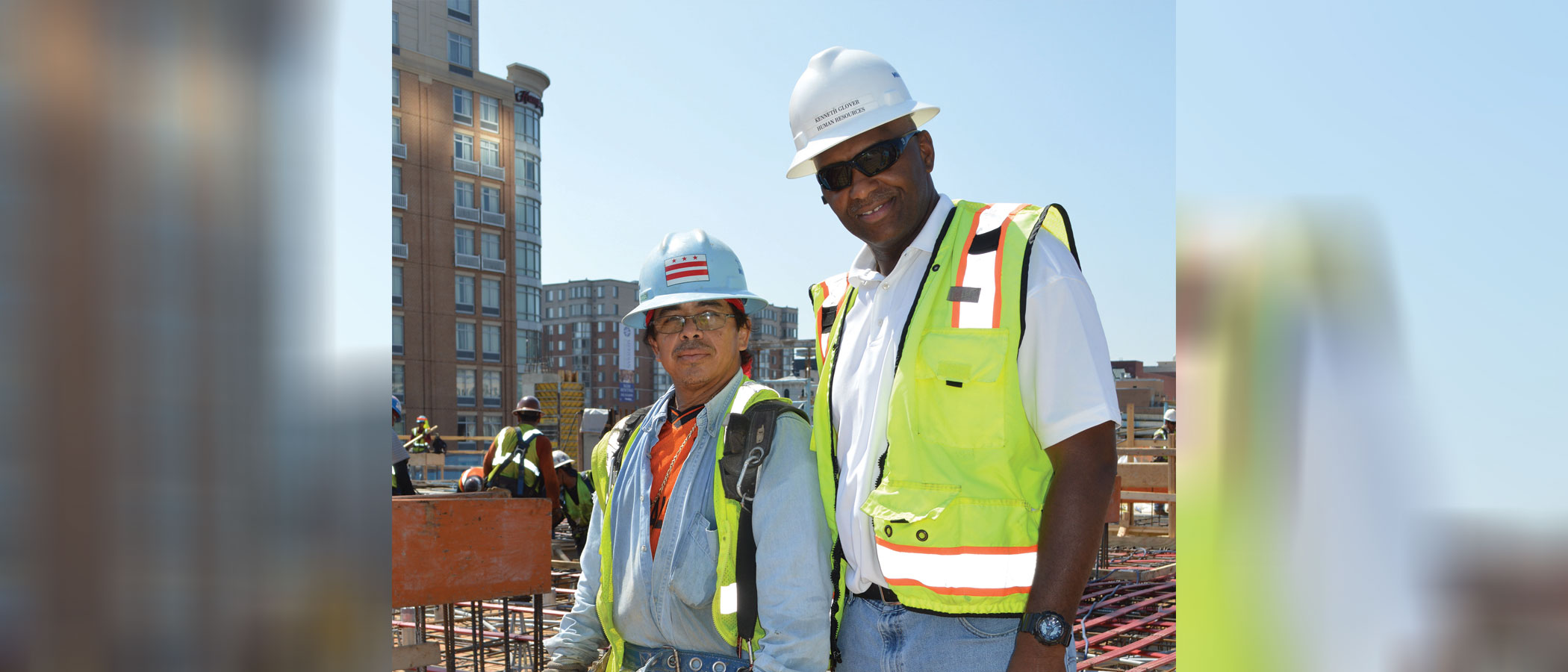Ask the day his life turned around, and Kenny Glover answers easily: Sept. 25, 1996. It’s a date seared into his mind. The day he knelt in his cell at the correctional treatment facility in D.C. while serving out the remainder of a six-year sentence for attempted robbery and burglary. On a Wednesday – after years struggling with crack cocaine and a cycle of incarceration that started at the age of 11 – he’d finally been “broken.”
“My mom wouldn’t answer the phone; she wouldn’t send me no money. It was just me and God,” remembers Glover, now 47. “I just got on my knees and prayed.”
Almost 19 years later, Glover is in a different and better place. He’s exchanged drugs and idle time that he readily admits led him to “criminal activity with a cocktail of crack cocaine, PCP, marijuana and alcohol” for mentorship and 12-hour-plus days with the construction company Miller & Long. There, he works in the human resources department. It’s the company where he started out as a carpenter’s helper in 2003, making $10 an hour.
Nowadays, Glover faces a different set of challenges: helping other formerly incarcerated men build their own success stories. As an HR specialist at Miller & Long, Glover does everything from doling out advice to younger guys new to working in the belly of a construction site, known as the pit, to transporting workers to health clinics and drug rehabilitation programs. Of course, he recruits for the company as well. Glover also leads regular discussions during ex-offender forums hosted at Miller & Long headquarters in Bethesda, Maryland. During these sessions, returning citizens have an open forum to discuss work and life issues, and are offered resources to help them succeed on the job.
“As returning citizens, there are already roadblocks in your way. You gotta let other people help,” explains Glover. He knows the hurdles these men face, because as a two-time felon, he needed a network when he was released in 2002.
For Glover, that started with the Rev. Donald Isaac, who headed the East of the River Clergy, Police, Community Partnership. “He gave me an opportunity,” says Glover, who worked for $6.25 an hour sweeping and cleaning up around the nonprofit’s office on First Street in Southeast Washington, D.C. When the grant money ran out, Glover says he had a chance encounter with John McMahon, chairman of Miller & Long. Soon thereafter, he started in construction.
It’s an industry, he continues, that is hard work and stressful. So his goal is to keep men on the job while helping them deal with their issues – whether that’s drug addiction, anger management, financial or otherwise. According to Glover, however, the biggest obstacles to keeping ex-offenders employed are drug use and simply getting guys to show up for work. “That’s how we lose a lot of guys,” he admits. “They have to want to change.”
That inner desire to change is what has kept Glover from serving more time behind bars. “I wanted something better. I didn’t want to be no skid row bum,” he says. “Looking at a lot of older guys that were in prison … I didn’t want to be like that.”
No easy task for someone who smoked his first joint at 11 years old and started breaking into houses by the time he was 12. “My father wasn’t there. I didn’t have a father figure or brother to look up to,” says Glover, noting that his mother, Barbara, raised him “right” and he never lived in the projects. “She couldn’t teach me the things a young black kid living in Southeast needed to know.”
Glover has learned a lot over the years, including how to cope when life takes unexpected turns. In a 2005 article in The Washington Post, Glover said that by the age of 40 he wanted to be a crane operator, and married with a family and home. While he had an eight-month stint working the crane, he is still working on the other goals. And he still lives in Southeast and is focused on his career at the company that gave him a chance. “This is my longevity. I don’t have to put on tools no more or be out in the sun all day,” says Glover, who plans to rack up at least 25 years at Miller & Long. “I plan on retiring there.”

